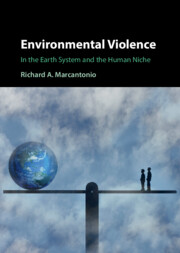
- Publisher:
- Cambridge University Press
- Online publication date:
- July 2022
- Print publication year:
- 2022
- Online ISBN:
- 9781009170802
Last updated 09/07/24: Online ordering is currently unavailable due to technical issues. We apologise for any delays responding to customers while we resolve this. For further updates please visit our website: https://www.cambridge.org/news-and-insights/technical-incident


The concept of environmental violence (EV) explains the harm that humanity is inflicting upon itself through our pollution emissions. This book argues that EV is present, active, and expanding at alarming rates in the contemporary human niche and in the Earth system. It explains how EV is produced and facilitated by the same inequalities that it creates and reinforces, and suggests that the causes can be attributed to a relatively small portion of the human population and to a fairly circumscribed set of behaviours. While the causes of EV are complex, the author makes this complexity manageable to ensure interventions are more readily discernible. The EV-model developed is both a theoretical concept and an analytical tool, substantiated with rigorous social and environmental scientific evidence, and designed with the intention to help disrupt the cycle of violence with effective policies and real change.
‘Rich in theoretical depth and grounded in illuminating case studies, Environmental Violence in the Earth System and the Human Niche provides readers with a penetrating analysis of violence and its impact on both humanity and the environment. An important read for anyone interested in understanding the coevolutionary relationship of environment and society and how human actions transform the environment.’
Daniel Auerbach - University of Wyoming
‘Environmental Violence breaks open the misleading notion that the climate catastrophe somehow sits on the looming horizon - just ahead. Slowly encroaching. The research found in these pages and stories, amply supported by interdisciplinary empirical evidence, offers a paradigm shift: across our globe, lethal violence due to human produced toxicities, hidden in plain sight, has been with us and growing exponentially every single year. This book reframes our mental model and requires us to bridge public health, environmental justice, and peacebuilding. Marcantonio has compiled the most comprehensive and penetrating look into the challenges posed by our local and global behavior and the potential pathways for change we must face if our human niche is to survive and offer a better belonging to future generations. A must read across a wide swath of physical and social sciences.’
John Paul Lederach - University of Notre Dame
‘Deftly contrasting direct violence - usually clear and straightforward in action - with environmental violence - that often lacks a direct perpetrator-victim link - Marcantonio takes the reader on an informative and meaningful journey of discovery. Navigating the social, ecological, and structural impacts and processes of anthropogenic ecosystems and their landscapes, and legacies, of environmental harm, Marcantonio demonstrates how, and why, the perturbations caused by structural and institutional inequities are central in the human capacities to live, resist, and flourish in the 21st century. Marcantonio’s model acts to identify key mechanisms of crisis and highlight particularly crucial points of disturbance by integrating core anthropological and peace studies methodologies with methods from across the environmental sciences. This book presents a holistic social and environmental understanding of contemporary crises facing the Earth System and the Human Niche.’
Agustín Fuentes - Princeton University
 Loading metrics...
Loading metrics...
* Views captured on Cambridge Core between #date#. This data will be updated every 24 hours.
Usage data cannot currently be displayed.